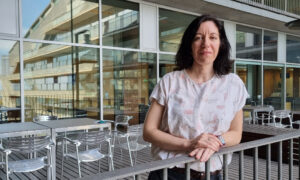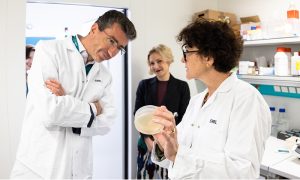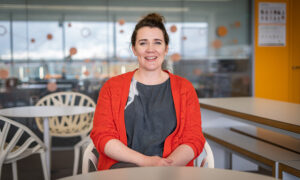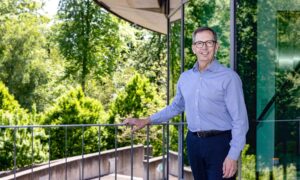
Science is universal – we must stand up for it
An interview with Rolf-Dieter Heuer, President of SESAME, who was guest speaker at EMBL’s 2017 Annual Reception
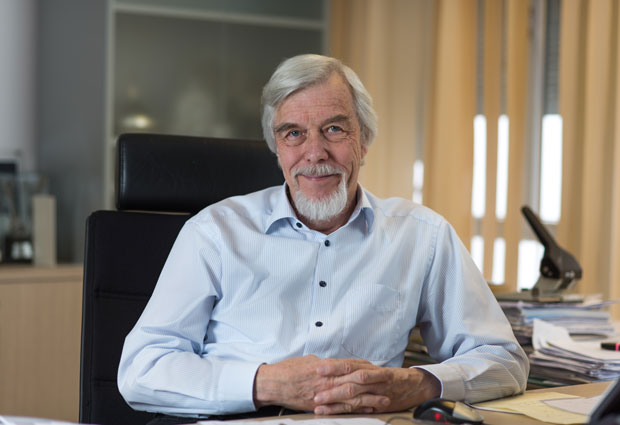
What were the key messages of your talk?
The world needs science. Not just applied science or technology, but the whole spectrum of research. Sometimes there is pressure to design projects that can be used immediately by society. However, all science has roots in fundamental research and it is important to have a combination of focused research and basic science – just a few examples being the World Wide Web, smartphones, GPS, solar panels and many innovative medicines. You need a virtuous circle of basic research, driving innovation, which drives focused research, which drives more innovation, and ultimately feeds back into improved basic research. If you break this virtuous circle then at some stage you will have no science and we must by all means avoid that.
At the same time, science bridges cultures and nations because it’s a universal language. In today’s globalised world this is even more important than it was 40 or 60 years ago. Research brings people together – united by science rather than divided by politics. Science needs an open atmosphere: open to argument, open to suggestions and open to everybody. I saw the benefits of this firsthand during my time as CERN Director-General and now at SESAME, a new synchrotron that has recently opened in the Middle East.
What are your hopes for the SESAME project? What is your role?
The SESAME project is a project of hope. The idea, born 20 years ago, was to create a world-leading scientific institute in the Middle East with the participation of researchers diverse in expertise, nationality and background. A synchrotron is the ideal facility to achieve these goals. The facility will be used to do research in biology, medicine, archaeology, environmental studies, physics, material science, chemistry and many others. SESAME’s governance is modelled along the same lines of EMBL and CERN, meaning there is a Council where members are represented – I am now the President of that Council.
Science projects are getting ever larger, like the big accelerators needed in modern particle physics or initiatives such as the human genome project and its successors. These huge projects implicitly require collaboration, and to achieve this you need to build trust, sustainability and long-term support from funders. International organisations such as EMBL and CERN are fantastic examples of what Europe can achieve when it works together with its partners and our hope is that the model – and the spirit of science and collaboration it creates – will drive similar success at SESAME.
You are also an advisor to the European Commission – what are your priorities in this respect?
We provide the EC with scientific advice on policy issues, where such advice is critical to the development of EU policies or legislation. Policy makers can play an important role in connecting science and society, especially when explaining the role of science in decision making – I encourage them to explain science as if they were with friends in a bar. But it is equally crucial for scientists to use a language that politicians and the general public understand.
EMBL is now chairing EIROforum. From your experience, what do you think are the benefits of this kind of organization?
I think scientists need to join forces and raise their voices: The global movement that led to the March for Science is an example where researchers identified a problem and spoke out in numbers. Another example is EIROforum, which brings together eight of the largest intergovernmental research organisations in Europe. Together we look to find synergies in areas like computing, instrumentation and technology transfer. Where possible we also aim to express a unified voice in key areas of European science policy. Eight together is much stronger than one alone, especially if one combines many disciplines.
What do you think is the most important skill the next generation of scientists needs to learn?
To question everything, be critical – but positively critical – and to appreciate the art of collaboration.
 Curiosity is a profoundly human trait. We start asking questions almost as soon as we learn to speak and continuously redefine our understanding of the world by questioning it. This is the driving force behind science, technology, engineering and maths. As part of our curiosity editorial theme, we are exploring what EMBL is curious about.
Curiosity is a profoundly human trait. We start asking questions almost as soon as we learn to speak and continuously redefine our understanding of the world by questioning it. This is the driving force behind science, technology, engineering and maths. As part of our curiosity editorial theme, we are exploring what EMBL is curious about.
Read more articles about curiosity and where it can take you.
